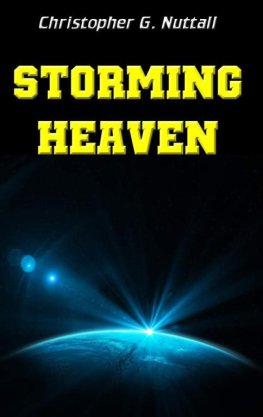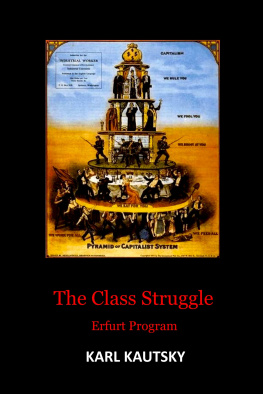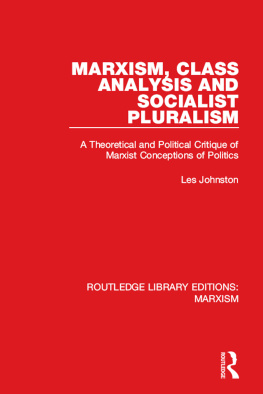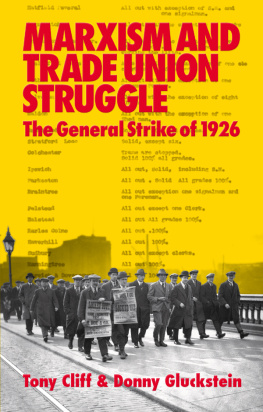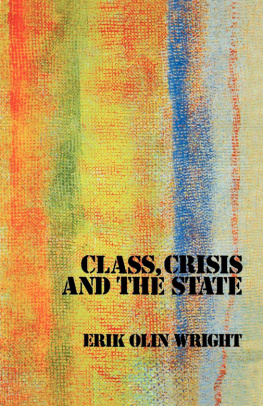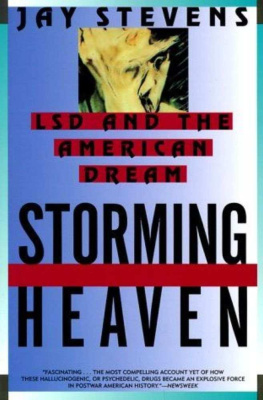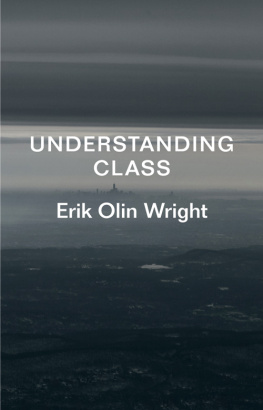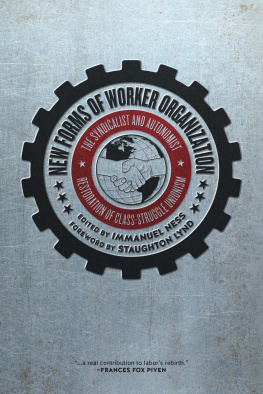Steve Wright - Storming Heaven: Class Composition and Struggle in Italian Autonomist Marxism
Here you can read online Steve Wright - Storming Heaven: Class Composition and Struggle in Italian Autonomist Marxism full text of the book (entire story) in english for free. Download pdf and epub, get meaning, cover and reviews about this ebook. year: 2002, publisher: Pluto Press, genre: Politics. Description of the work, (preface) as well as reviews are available. Best literature library LitArk.com created for fans of good reading and offers a wide selection of genres:
Romance novel
Science fiction
Adventure
Detective
Science
History
Home and family
Prose
Art
Politics
Computer
Non-fiction
Religion
Business
Children
Humor
Choose a favorite category and find really read worthwhile books. Enjoy immersion in the world of imagination, feel the emotions of the characters or learn something new for yourself, make an fascinating discovery.

- Book:Storming Heaven: Class Composition and Struggle in Italian Autonomist Marxism
- Author:
- Publisher:Pluto Press
- Genre:
- Year:2002
- Rating:3 / 5
- Favourites:Add to favourites
- Your mark:
- 60
- 1
- 2
- 3
- 4
- 5
Storming Heaven: Class Composition and Struggle in Italian Autonomist Marxism: summary, description and annotation
We offer to read an annotation, description, summary or preface (depends on what the author of the book "Storming Heaven: Class Composition and Struggle in Italian Autonomist Marxism" wrote himself). If you haven't found the necessary information about the book — write in the comments, we will try to find it.
Storming Heaven: Class Composition and Struggle in Italian Autonomist Marxism — read online for free the complete book (whole text) full work
Below is the text of the book, divided by pages. System saving the place of the last page read, allows you to conveniently read the book "Storming Heaven: Class Composition and Struggle in Italian Autonomist Marxism" online for free, without having to search again every time where you left off. Put a bookmark, and you can go to the page where you finished reading at any time.
Font size:
Interval:
Bookmark:
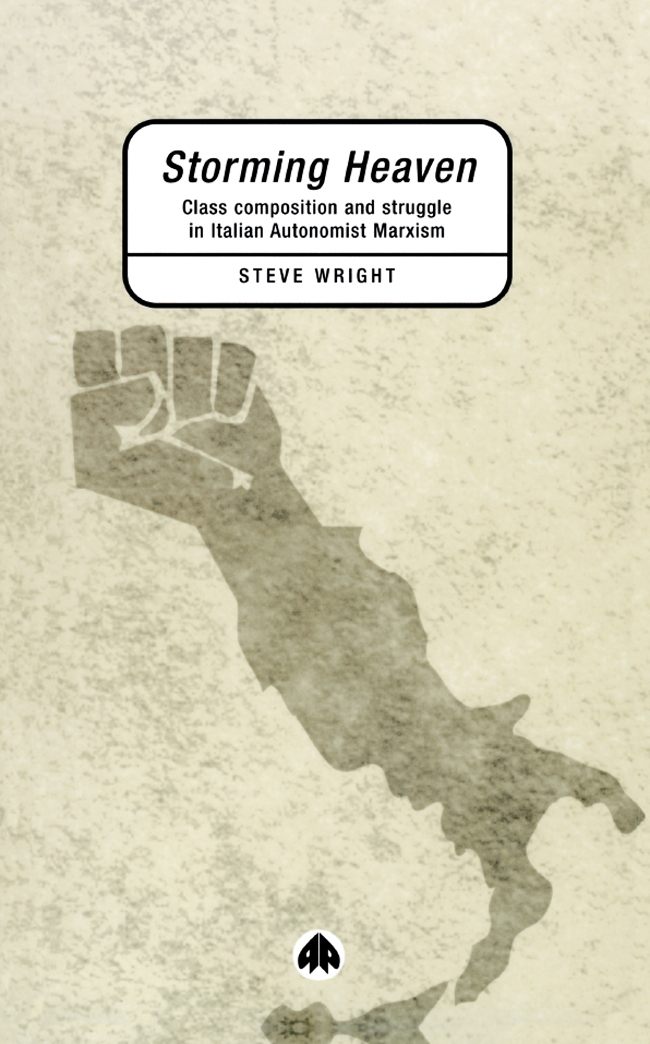
Storming Heaven
Storming Heaven
Class Composition and Struggle
in Italian Autonomist Marxism
Steve Wright

First published 2002 by Pluto Press
345 Archway Road, London N6 5AA
www.plutobooks.com
Copyright Steve Wright 2002
The right of Steve Wright to be identified as the author of this work has been asserted by him in accordance with the Copyright, Designs and Patents Act 1988.
British Library Cataloguing in Publication Data
A catalogue record for this book is available from the British Library
ISBN 978 0 7453 1607 9 Hardback
ISBN 978 0 7453 1606 2 Paperback
ISBN 978 1 8496 4083 1 PDF eBook
ISBN 978 1 7837 1473 5 Kindle eBook
ISBN 978 1 7837 1472 8 EPUB eBook
Library of Congress Cataloging in Publication Data
Wright, Steve, 1958
Storming heaven : class composition and struggle in Italian autonomist marxism / Steve Wright.
p. cm.
Includes bibliographical references.
ISBN 0745316077 (hard) ISBN 0745316069 (pbk.)
1. Working classItalyHistory20th century. 2. Labor movementItalyHistory20th century. 3. CommunismItalyHistory20th century. 4. ItalyPolitics and government20th century. I. Title.
HD8481 .W75 2002
335.430945dc21
2001004857
11100908070605040302
1098765 4321
Designed and produced for Pluto Press by
Chase Publishing Services, Fortescue, Sidmouth EX10 9QG
Typeset from disk by Stanford DTP Services, Towcester
Printed on Demand in the European Union by
CPI Antony Rowe, Eastbourne, UK
these Parisians, storming heaven ...
Marx to Kugelmann, 12 April 1871
[Our] line has found its theoretical and political, tactical and
strategic verification in the struggle of the FIAT workers in the
renewed working class project of storming heaven.
La Classe, August 1969
Our sabotage organises the proletarian assault on the heavens.
And in the end those damned heavens will no longer be there!
Antonio Negri, Capitalist Domination and Working Class Sabotage,
September 1977
(trans. Red Notes)
Contents
Acknowledgements
This book began life as a doctoral thesis, inspired in large part by Ed Emerys work as translator and archivist. Over the course of its writing I became indebted to a number of people for their assistance: along with Ed himself, I would particularly like to mention my thesis supervisor Alastair Davidson, Vicky Franzinetti, Hilary Partridge and Larry Wright. I also benefited greatly from brief discussions with Ferruccio Gambino, John Merrington, Peppino Ortoleva and Marco Revelli. Jim Asker, Peter Beilharz, Carlo Carli, Pasquale Coppola DAngelo, Richard Curlewis, Chris Healy, David Lockwood, Anna Marino, Sandro Portelli, Pierangelo Rosati (Hobo), Riccardo Schirr and Jeff Soar all provided hard-to-find reference materials. My thesis examiners, Grant Amyot and Donald Sassoon, made constructive comments concerning its possible publication.
That a version of it has indeed finally appeared in print is largely due to the impetus provided by Patrick Cuninghame, John Hutnyk and Gioacchino Toni, combined with the enthusiasm of Anne Beech at Pluto Press. Along the way, I was sustained by the encouragement of the following: Franco Barchiesi, Jon Beasley-Murray, Volker Beyerle, Mike Brown, Verity Burgmann, Harry Cleaver, Steve Cowden, Massimo De Angelis, Nick Dyer-Witheford, Gra, Matt Holden, Sonya Jeffery, Pete Lentini, Bruce Lindsay, Angela Mitropoulos, Gavin Murray, Curtis Price, and Myk Zeitlin. A number of friends in Italy Pino Caputo, Cosimo Scarinzi, Beatrice Stengel and Renato Strumia have again been helpful with sources. Thanks too to John Holloway for help with a last minute citation.
Unless otherwise indicated, all translations are my own. Needless to say, all mistakes also remain my own.
I owe a special debt of gratitude to Rosa Lorenzon, who has long borne the intrusions of this project with a stoic tolerance and humour. I dedicate this book both to her and to our little rebels Ginevra and Sean.
Introduction
The cusp of the new century has seen something of an upsurge of the anti-statist left in Western countries and beyond, as part of a broader movement against global capital. If much of this resurgence can rightly be claimed by various anarchist tendencies, autonomist Marxism has also encountered renewed interest of late (Dyer-Witheford 1999). Given that the core premises of autonomist Marxism were first developed in Italy during the 1960s and 1970s, now is an opportune time to examine their origin and development within the stream of Italian Marxism known popularly as operaismo (literally, workerism).
By the late 1970s, operaismo had come to occupy a central place within the intellectual and political life of the Italian left. While its impact was most apparent in the field of labour historiography, discussions concerning the changing nature of the state and class structure, economic restructuring and appropriate responses to it even philosophical debates on the problem of needs were all stamped with workerisms characteristic imprint (Pescarolo 1979). Nor was its influence confined simply to circles outside the Italian Communist Party (PCI), as the attention then paid to its development by leading party intellectuals some of them former adherents made clear (DAgostini 1978).
None the less, workerisms weight remained greatest within the tumultuous world of Italian revolutionary politics, above all amongst the groups of Autonomia Operaia (Workers Autonomy). As the three major political formations to the left of the PCI plunged into crisis after their disappointing performance in the 1976 national elections, Autonomia began to win a growing audience within what was then the largest far left in the West. When a new movement emerged in and around Italian universities the following year, the autonomists were to be the only organised force accepted within it. With their ascent, workerist politics, marginalised nationally for half a decade, would return with a vengeance.
Curiously, these developments then engendered little interest within the English-speaking left. While the rise of Eurocommunism in the 1970s made Italian politics topical, encouraging the translation both of Communist texts and some of their local Marxist critiques, the efforts of the workerist left were passed over in silence. Little, indeed, of workerist material had at that point been translated at all, and what was available pertaining for the most part to operaismos classical phase during the 1960s gave a somewhat outdated view of its development. It is not surprising, therefore, that on the few occasions when reference was made to workerism in the English language, it was often to a caricature of the Italian tendency.
Despite this, workerist perspectives did succeed in touching some sections of the British and North American left. The advocates of Wages for Housework, whose controversial views were to spark a lively debate amongst feminists (Malos 1980), drew many of their arguments from the writings of the workerist-feminist Maria Rosa Dalla Costa. In a similarly iconoclastic vein, the male editors of Zerowork set about reinterpreting contemporary working-class struggles in the US and abroad from a viewpoint strikingly different to those of other English-speaking Marxists (Midnight Notes 1990). Yet even these endeavours, while worthy of note in their own right, were to contain nuances quite different to those of their Italian counterparts, and could shed only limited light upon
Font size:
Interval:
Bookmark:
Similar books «Storming Heaven: Class Composition and Struggle in Italian Autonomist Marxism»
Look at similar books to Storming Heaven: Class Composition and Struggle in Italian Autonomist Marxism. We have selected literature similar in name and meaning in the hope of providing readers with more options to find new, interesting, not yet read works.
Discussion, reviews of the book Storming Heaven: Class Composition and Struggle in Italian Autonomist Marxism and just readers' own opinions. Leave your comments, write what you think about the work, its meaning or the main characters. Specify what exactly you liked and what you didn't like, and why you think so.



